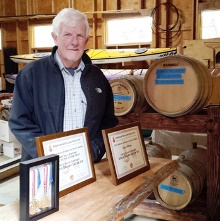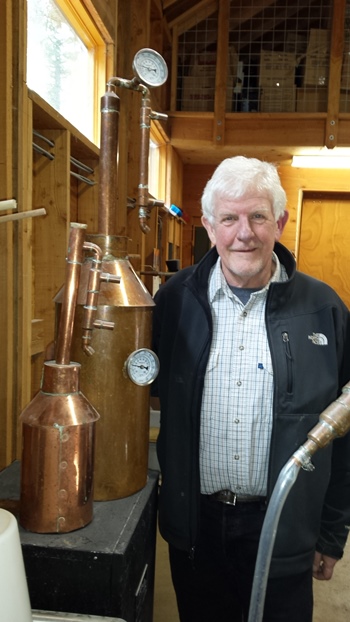Islanders, cultivate your heritage apples and pears
–by Margie Doyle —
Orcas Island Distillery won top honors at this year’s American Distilling Institute’s Judging of Craft Spirits at the Institute’s Convention in San Diego [on April 8] where 200 national and international craft distilleries competed in all categories with more than 640 entries.
Orcas Island Distillery’s Senior Distiller Charles West said, “This is an incredible honor for us. We won over the biggest and most respected names in the craft distilling industry.
“First, the distillery won the Gold Medal for its Apple Brandy Eau de Vie, and then it won a second Gold Medal when its spirit was judged to be the best of all Eau de Vie brandies entered in the competition.
“Eau de Vie translates as “water of life” and it refers to newly made brandies. Delicious when it is young, Eau de Vie is unlike its grain-based cousin whiskey that requires barrel aging to be drinkable. While it is a strong spirit, Eau de Vie has a delightful flavor reminiscent of the fruit from which it’s made. Innovative craft bartenders are using specialty produced Eau de Vie to replace mass produced vodkas in their favorite signature cocktails,” said West.
Indeed, along with beers, meads and ciders, the boutique cultivation of spirits, such as gin, vodka, and brandies are having a resurgence. After retiring from an active career in television production, to become an “outsourced executive,” Charles West and his family settled on Orcas Island some 30 years ago.
They loved the spot they found on Mount Woolard, and built their home and what is now the distillery workshop over time, starting with a cabin and an outdoor kitchen. West cleared trees on his property, and when it was too difficult to steer a timber truck down his winding road, he instead brought in a sawmill and for two years milled the logs that are in the workshop. It was built originally for car and boat storage, with concrete floor, and a huge amount of power incorporated.
But West felt such a fine workshop “needed a higher use.” West thought he’d try something that called upon 500-year-old technology, distillation of fine spirits. His first experience involved going into the kitchen and mixing old molasses and baker’s yeast. “A week later, I had rum and I thought, ‘I can make it more complicated than this!'”
Apple cider and apple brandy were popular and essential agricultural products in pioneer days when water wasn’t safe. Apple cider automatically picks up the natural yeast and hardens into alcohol. But apple brandy disappeared from the American palate with prohibition. Washington was “particularly aggressive” in regulation, says West, and that continues today.
Orcas Island Distillery was licensed in 2014 as a Craft Distillery in Washington State. Along with crafting his own spirits, West traveled and wrote for the resurgent distillery industry in recent years.
“To become a distiller, you’re totally investigated and must fill out a 50-page license application. It doesn’t come easily.”
And once you have the license, “It’s a lot like farm work, but you’re in competition with multi-million dollar companies. People are starting drinking [spirits] again, but after prohibition was repealed, “only really big people could play,” says West. “Spirits got recognizable names, such as Jack Daniels or MacNaughton’s. Particularly in the U.S., the brands were reduced to a handful of players and people got used to drinking consistent spirits. But there’s no reason they shouldn’t change from year to year.
“Think of spirits as an enjoyable palate of flavors and that’s what we’re playing with. You do this and all of a sudden you’re tasting different flavors; your social drinking changes a lot.”
Changes in laws in the past 10 years have allowed for “boutique” distilleries such as Orcas Island Distillery. The smaller scale of such operations means you have to be creative, says West. For example, he’s made two small kilns to dry the malt he uses for whiskey, after cooking it in hot water and adding yeast.
There are two theories of distilling, West explained:
- Remove the liquid from a high temperature when it is a “neutral spirit” without much flavor and then add flavors in;
- Distill more slowly so as to bring out the flavor of the underlying agricultural product forward, i.e. malt whiskey, apple brandy, and so on.
The latter method is gaining in popularity, after years of big companies dominating the standard markets for whiskey, rum, vodka, among other “liquors”.
West uses only the heritage apples that have been on the island in its orchard heydey, early in the 1900s. Then, there were over 30 varieties. Those that remained are not attractive-looking but have more flavor and distill into wonderful brandy, West claims. Cultivation of old apple varieties is compatible with tourism but not dependent on tourism.
In winning his award from the US Distillers, West said, “The apples are what make us great. I’d like to thank the entire community, our family and our friends, we couldn’t have won without your help and support….and I’d like to encourage you to grow more apples”
Orcas Island Distillery also produces gin in a 500-year old style. West says, “We want to stay a traditional model. There’s lots of ways to go high-tech, but we can make truly classic spirits with what we have available. We sell a little bit locally, and expand distribution, but there’s a very limited supply of apples and pears.”
He owns two copper stills, (pictured above) the larger is registered and can be used under federal regulations. He encourages islanders to keep their land in agriculture and to grow more of the heritage apples, and to contact him when harvest time comes. West pays “a small amount of money” for the apples; he can be contacted by email at distiller@orcasislanddistillery.com
While heady from the awards, West is not resting on his laurels but is looking ahead. “After barrel aging, Eau de Vie loses its youthful flavor and evolves into another exquisite spirit that is most like a fine Cognac or Armagnac,” West says.” I can’t wait until next year’s competition to enter our island-made Aged Apple Brandy. It’s really going to be good!”
Appointments for tastings and visits to the distillery can be made by telephone at 376-7077 or email distiller@orcasislanddistillery.com
**If you are reading theOrcasonian for free, thank your fellow islanders. If you would like to support theOrcasonian CLICK HERE to set your modestly-priced, voluntary subscription. Otherwise, no worries; we’re happy to share with you.**









WOW; who would have imagined a world class distillery hidden in the woods on Mt. Woolard. Is this marvelous product available for purchase on Orcas?
I sure hope so, Ed. Am looking forward!
I know they sell it at Orcas Village Store